高铁乘务英语学习任务
- 格式:pptx
- 大小:2.65 MB
- 文档页数:9
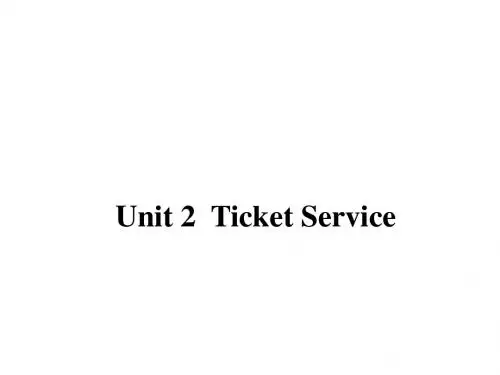

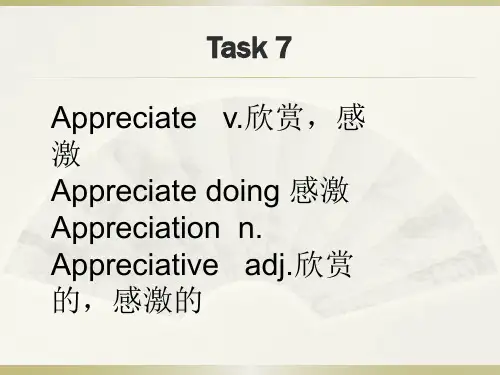
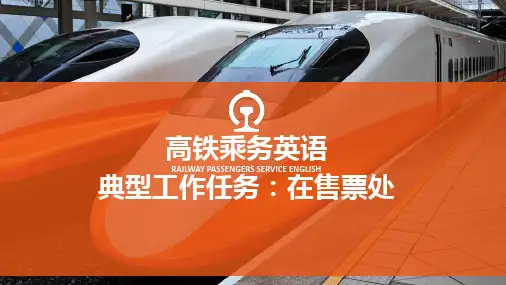
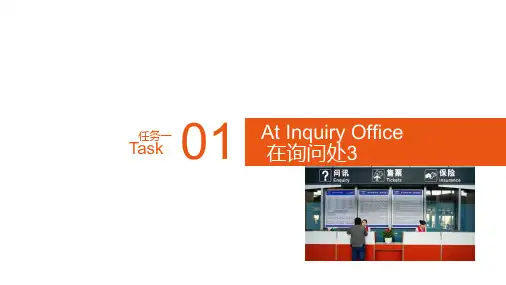
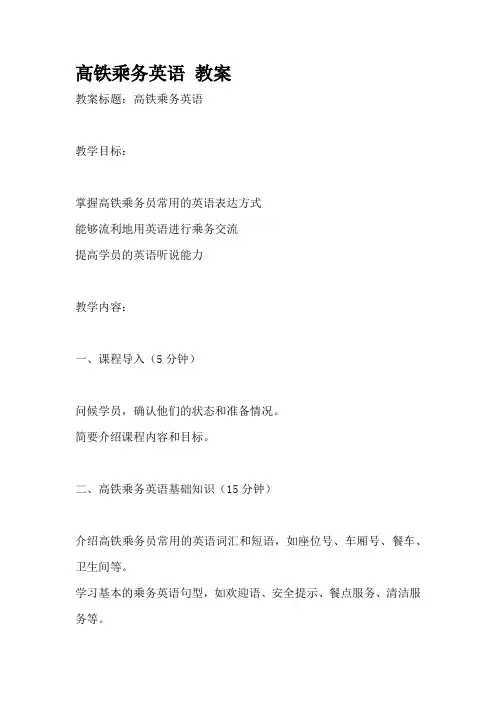
高铁乘务英语教案
教案标题:高铁乘务英语
教学目标:
掌握高铁乘务员常用的英语表达方式
能够流利地用英语进行乘务交流
提高学员的英语听说能力
教学内容:
一、课程导入(5分钟)
问候学员,确认他们的状态和准备情况。
简要介绍课程内容和目标。
二、高铁乘务英语基础知识(15分钟)
介绍高铁乘务员常用的英语词汇和短语,如座位号、车厢号、餐车、卫生间等。
学习基本的乘务英语句型,如欢迎语、安全提示、餐点服务、清洁服务等。
三、实景模拟训练(30分钟)
分组进行模拟训练,每组轮流扮演乘务员和乘客。
模拟各种场景,如售票、安检、候车、上车、下车等。
鼓励学员大胆开口,积极参与模拟训练。
四、听力练习(10分钟)
播放一段高铁乘务员的英语对话录音,让学员听后回答问题。
再播放一遍录音,让学员跟读并模仿对话。
学员自由练习听说,教师进行个别指导。
五、课堂回顾与总结(5分钟)
回顾本节课学到的知识点和技能。
强调重点和难点,提醒学员注意巩固练习。
预告下节课的学习内容。
教学评价:
对学员的口语表达能力和听力理解能力进行评价。
通过实景模拟训练,观察学员在实际场景中的运用能力。
让学员自评和互评,了解他们的学习情况和需求,以便改进教学方法。
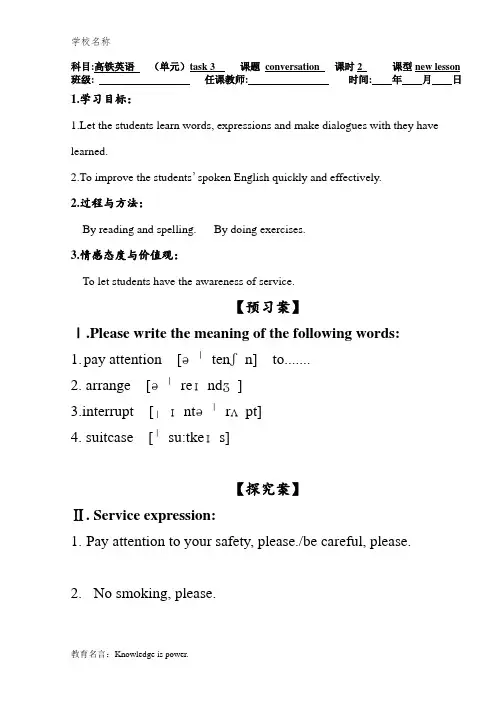
学校名称科目:高铁英语(单元)task 3 课题conversation 课时2 课型new lesson 班级: 任课教师: 时间: 年月日1.学习目标:1.Let the students learn words, expressions and make dialogues with they have learned.2.To improve the students’ spoken English quickly and effectively.2.过程与方法:By reading and spelling. By doing exercises.3.情感态度与价值观:To let students have the awareness of service.【预习案】Ⅰ.Please write the meaning of the following words:1.pay attention [əˈtenʃn] to.......2. arrange [əˈreɪndʒ]3.interrupt [ˌɪntəˈrʌpt]4. suitcase [ˈsu:tkeɪs]【探究案】Ⅱ. Service expression:1.Pay attention to your safety, please./be careful, please.2.No smoking, please.教育名言:Knowledge is power.Ⅲ. conversation:Dialogue 8 整理行李crew(列车员)passenger(乘客)Crew : Excuse me, please let me arrange the luggage for you.Crew: Sorry for interrupting, whose suitcase is this? Passenger: Excuse me, is there anything wrong with it ?Crew: It would be better if you could put your suitcase on the rack.Passenger: OK.Crew: Thanks for your cooperation, sir. Let me help you.【当堂检测】1.Recite words and phrases.2.Practice the dialogue with partners or do group work.教育名言:Knowledge is power.。

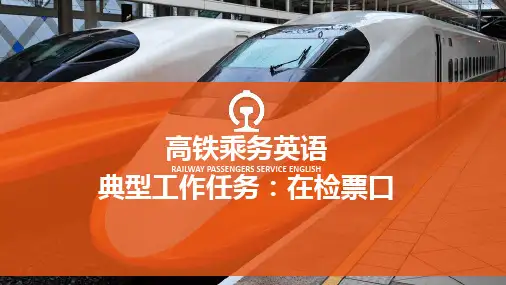
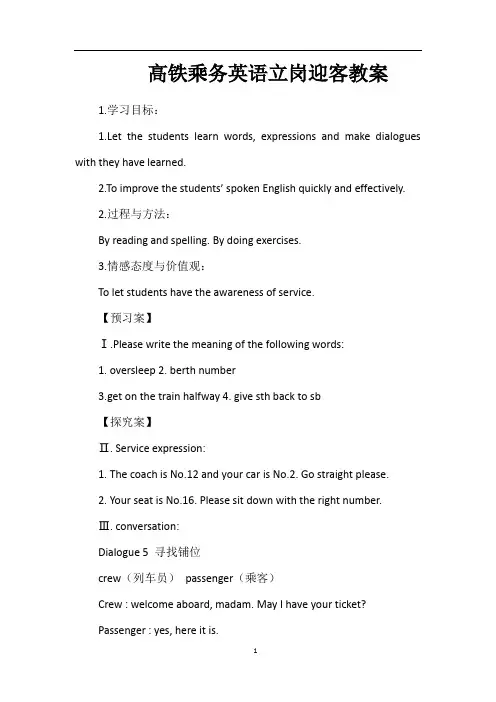
高铁乘务英语立岗迎客教案1.学习目标:1.Let the students learn words, expressions and make dialogues with they have learned.2.To improve the students’ spoken English quickly and effectively.2.过程与方法:By reading and spelling. By doing exercises.3.情感态度与价值观:To let students have the awareness of service.【预习案】Ⅰ.Please write the meaning of the following words:1. oversleep2. berth number3.get on the train halfway4. give sth back to sb【探究案】Ⅱ. Service expression:1. The coach is No.12 and your car is No.2. Go straight please.2. Your seat is No.16. Please sit down with the right number.Ⅲ. conversation:Dialogue 5 寻找铺位crew(列车员)passenger(乘客)Crew : welcome aboard, madam. May I have your ticket?Passenger : yes, here it is.Crew : Thank you. Right, this is your sleeping car. Your berth number is twenty-one, the lower one.Passenger : Thank you. It is a nice compartment. By the way, can you tell me how can I get there?Crew: come along with me, please.Passenger: All right.Crew: Here it is. You can put your luggage on the rack.Passenger: Thank you.【当堂检测】1. Practice the dialogue with partners or do group work.。
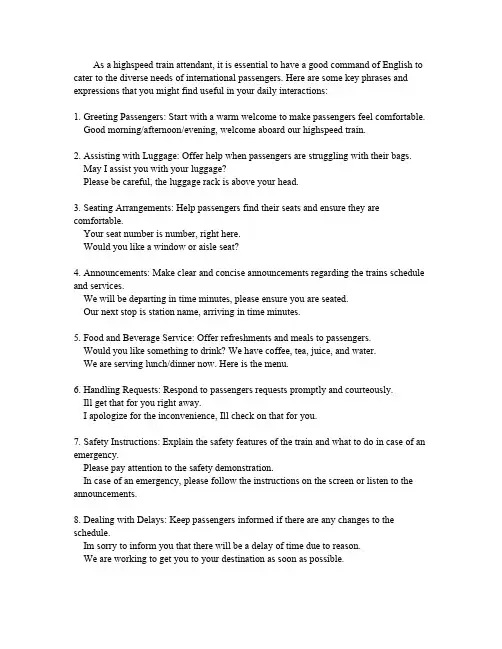
As a highspeed train attendant,it is essential to have a good command of English to cater to the diverse needs of international passengers.Here are some key phrases and expressions that you might find useful in your daily interactions:1.Greeting Passengers:Start with a warm welcome to make passengers feel comfortable. Good morning/afternoon/evening,welcome aboard our highspeed train.2.Assisting with Luggage:Offer help when passengers are struggling with their bags. May I assist you with your luggage?Please be careful,the luggage rack is above your head.3.Seating Arrangements:Help passengers find their seats and ensure they are comfortable.Your seat number is number,right here.Would you like a window or aisle seat?4.Announcements:Make clear and concise announcements regarding the trains schedule and services.We will be departing in time minutes,please ensure you are seated.Our next stop is station name,arriving in time minutes.5.Food and Beverage Service:Offer refreshments and meals to passengers.Would you like something to drink?We have coffee,tea,juice,and water.We are serving lunch/dinner now.Here is the menu.6.Handling Requests:Respond to passengers requests promptly and courteously.Ill get that for you right away.I apologize for the inconvenience,Ill check on that for you.7.Safety Instructions:Explain the safety features of the train and what to do in case of an emergency.Please pay attention to the safety demonstration.In case of an emergency,please follow the instructions on the screen or listen to the announcements.8.Dealing with Delays:Keep passengers informed if there are any changes to the schedule.Im sorry to inform you that there will be a delay of time due to reason.We are working to get you to your destination as soon as possible.9.Providing Information:Answer passengers questions about the trains facilities and services.The restrooms are located at the front/rear of the train.We have WiFi available on board,the password is password.10.Farewell:End the journey on a positive note.We hope you enjoyed your trip with us.Thank you for choosing our highspeed train service.Remember,effective communication is key to ensuring a pleasant journey for all passengers.Be attentive,patient,and professional in your interactions.。
高铁英语学习计划初中IntroductionHigh-speed rail, as one of the fastest and most convenient means of transportation, has become increasingly popular around the world. With the expansion of high-speed rail networks, the ability to communicate in English has become a crucial skill for those working in the industry. Therefore, it is essential for individuals who are interested in pursuing a career in the high-speed rail sector to improve their English language skills. This learning plan aims to provide a comprehensive guide for middle school students who wish to enhance their English proficiency in order to pursue a career in the high-speed rail industry.GoalsThe primary goal of this learning plan is to enable students to communicate effectively in English, both orally and in writing, within the context of the high-speed rail industry. Specific objectives include:1. Developing a strong foundation in English grammar, vocabulary, and pronunciation.2. Improving reading and listening comprehension skills in English, with a focus on high-speed rail-related materials.3. Enhancing oral communication skills, including the ability to participate in conversations, meetings, and presentations.4. Improving writing skills to effectively convey information and ideas in English, particularly within the context of high-speed rail.Learning ResourcesIn order to achieve the learning goals, the following resources will be utilized:1. Textbooks and workbooks: Selected English language textbooks and workbooks that focus on relevant grammar, vocabulary, and pronunciation will be utilized to provide a structured learning approach.2. Online resources: Various online platforms, such as educational websites, language learning apps, and online courses, will be used to access supplemental learning materials, exercises, and interactive activities.3. High-speed rail-related materials: Articles, videos, and other materials related to high-speed rail will be utilized to practice reading and listening skills within the context of the industry.4. Language exchange programs: Participation in language exchange programs, either in person or online, will be encouraged to provide opportunities for real-life communication practice with native English speakers.Study PlanThe study plan will consist of the following components:1. English Grammar and Vocabulary (6 weeks)- Daily study of grammar and vocabulary topics, with a focus on relevant English language skills needed for the high-speed rail industry.- Completion of exercises and quizzes to reinforce learning and assess progress.- Regular use of language learning apps and online resources for additional practice and review.2. Reading and Listening Comprehension (6 weeks)- Reading and listening to high-speed rail-related materials, such as news articles, reports, and videos, to improve comprehension skills.- Engaging in discussions and activities related to the materials to practice understanding and interpreting information within the context of the industry.3. Oral Communication (6 weeks)- Practice of speaking and conversational skills, with a focus on high-speed rail-related topics.- Role-playing exercises, presentations, and group discussions to develop confidence and fluency in oral communication.4. Writing Skills (6 weeks)- Writing practice, including composing emails, reports, and other professional correspondence related to high-speed rail.- Feedback and review of written work to improve clarity, coherence, and overall writing skills.AssessmentThroughout the learning plan, ongoing assessments will be conducted to evaluate students' progress. Assessments will include:1. Regular quizzes and tests to gauge understanding of grammar, vocabulary, and language skills.2. Oral presentations and discussions to assess speaking and communicative abilities.3. Written assignments and projects to evaluate writing proficiency and comprehension of high-speed rail-related materials.4. Feedback and self-assessment to encourage reflective learning and continuous improvement.ConclusionOverall, this high-speed rail English learning plan aims to provide middle school students with the essential language skills needed to pursue a career in the high-speed rail industry. By focusing on grammar, vocabulary, comprehension, and communication skills within the context of high-speed rail, students will be equipped with the language proficiency necessary to succeed in this field. Through a structured study plan and the use of diverse resources, students will have the opportunity to achieve their learning goals and enhance their English language abilities for future success.。
高铁乘务员日常英语作文1. Hey there! Just finished another shift as a high-speed train attendant. It's always a busy day on board, but I love interacting with passengers and making sure they have a comfortable journey.2. One of the best parts of my job is helping passengers with their needs, whether it's finding their seats, providing information about the train schedule, or offering snacks and drinks from the dining car.3. Dealing with different types of passengers can be challenging sometimes, but it's all part of the job. From families with kids to business travelers, I always try to be friendly and helpful to everyone on board.4. Safety is our top priority on the train, so I make sure to keep an eye on the passengers and remind them of the safety regulations, especially during emergencies or unexpected situations.5. The train crew works together as a team to ensure a smooth and efficient operation. We communicate constantly through our radios and coordinate our efforts to provide the best service to our passengers.6. After a long day on the train, I always feel a sense of satisfaction knowing that I've helped make someone's journey a little bit better. It's a rewarding job that I wouldn't trade for anything else.。
铁路英语学习计划IntroductionLearning English is important for railway professionals as it helps in effective communication with passengers, colleagues, and stakeholders. This learning plan is designed to help railway professionals improve their English language skills and develop confidence in using English in various railway-related scenarios.GoalsThe main goal of this learning plan is to help railway professionals improve their English language skills in order to:1. Communicate effectively with passengers, colleagues, and stakeholders2. Understand and use railway-specific vocabulary and terminology3. Read and comprehend railway-related documents and announcements4. Write effectively and accurately for various railway-related purposesComponents of the Learning PlanThe learning plan is divided into the following components:1. Vocabulary Building2. Listening and Speaking Practice3. Reading Comprehension4. Writing Skills5. Cultural AwarenessComponent 1: Vocabulary BuildingVocabulary building is essential for railway professionals as it helps them understand and use railway-specific terminology and communicate effectively with passengers and colleagues. This component includes the following activities:• Learning railway-specific vocabulary and terminology related to ticketing, train operations, safety, customer service, etc.• Using flashcards or digital apps to review and memorize new words and phrases• Practicing pronunciation and speaking exercises to improve verbal communication skills Component 2: Listening and Speaking PracticeListening and speaking are important skills for railway professionals as they need to understand and respond to passenger inquiries, announcements, and instructions. This component includes the following activities:• Liste ning to and transcribing railway announcements, safety instructions, and passenger inquiries• Participating in conversation practice with colleagues or language partners to improve speaking skills• Watching and listening to railway-related videos, podcasts, and audio recordings for comprehension and pronunciation practiceComponent 3: Reading ComprehensionReading comprehension is essential for railway professionals as they need to understand and interpret railway-related documents, schedules, and regulations. This component includes the following activities:• Reading and analyzing railway-related materials such as schedules, regulations, safety guidelines, and passenger information• Identifying key information and understanding the main ideas in railway-related texts • Practicing reading comprehension exercises and quizzes to improve understanding and retention of informationComponent 4: Writing SkillsWriting skills are important for railway professionals as they need to communicate effectively through email, reports, and other written documents. This component includes the following activities:• Practicing writing emails, reports, and announcements related to ticketing, operations, safety, and customer service• Reviewing and editing written wo rk for clarity, accuracy, and appropriateness• Receiving feedback and making improvements based on language proficiency and communication effectivenessComponent 5: Cultural AwarenessCultural awareness is important for railway professionals as they interact with passengers, colleagues, and stakeholders from diverse cultural backgrounds. This component includes the following activities:• Learning about the cultural norms, etiquette, and communication styles of the target English-speaking countries• Role-playing and simulating various railway-related scenarios to practice cultural sensitivity and effective communication• Reflecting on personal experiences and seeking feedback to improve intercultural communication skillsAssessment and FeedbackRegular assessments and feedback sessions will be conducted to evaluate the progress and performance of railway professionals in their English language learning. Assessments may include quizzes, role-plays, presentations, and written assignments. Feedback will be provided based on language proficiency, communication effectiveness, and cultural awareness.ConclusionThe railway English learning plan is a comprehensive and systematic approach to improving English language skills for railway professionals. By focusing on vocabulary building, listening and speaking practice, reading comprehension, writing skills, and cultural awareness, railway professionals can enhance their communication abilities and become more confident in using English in various railway-related scenarios. With regular assessments and feedback, railway professionals can track their progress and make continuous improvements in their English language skills.。
1.CRH 中国高速铁路(China Railways High-speed)2.bullet train 动车3.conductor 列车长4.car attendant; train attendant 列车员5.waiting room 候车室6.dining car, restaurant car, diner 餐车7.Free of charge 免费8.window seat 靠窗座位9.make a broadcast 广播一下,broadcasting room 广播室dies and gentlemen,女士们先生们:11.Security check, please!请安检!12.No smoking here please.请勿抽烟13.What’s the matter? 您怎么了?14.Mind your steps. 注意脚下15.Ticket, please. Have your ticket back. 您的票!请把票那好。
16.This way, please. Follow me, please. 请这边走。
请跟我走。
17.The other end of the coach. 在车厢的那一端。
18.Your passport, please. 您的护照。
19.Just wait a moment. Ok? 稍等会,好吗?20.Sorry, I don’t quite understand you. speak slowly抱歉,我没听懂,您说慢一点21.Welcome aboard our train. I’ll be at your service during the whole journey.欢迎乘坐我们的列车,我将全程为你们服务。
22.Attention, please. The next station is zhengzhou(xi an).请大家注意,下一张是郑州(西安)。